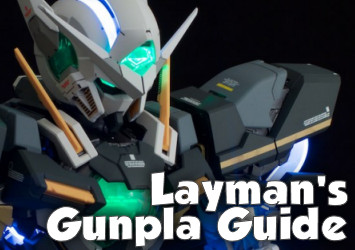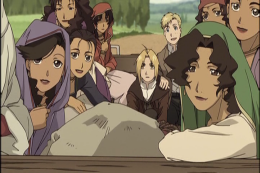
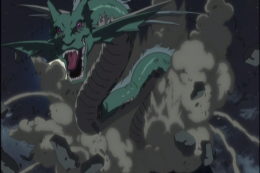 *****SPOILERS*****
*****SPOILERS*****
Synopsis: After the events of the first TV series, Edward Elric finds himself still trapped in our Earth, having all but given up hope of returning home and reuniting with his brother. However, the Thule Society, looking for the mythical paradise of Shamballa, plan to open the Gate with the help of Envy and a gypsy girl named Noah who Ed has befriended. Edward has to stop them from taking over both worlds.
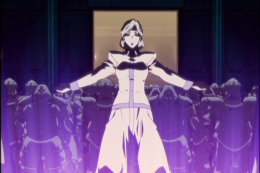
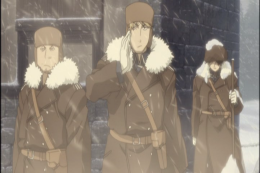 Comments:
Conqueror of Shamballa seems to get a bad reputation. Whenever anyone brings up their love for Fullmetal Alchemist, they often say, "Well, except Conqueror of Shamballa." When speculation began over the new FMA movie, The Sacred Stars of Milos, people were saying, "Hey, as long as it isn't like Conqueror of Shamballa", which caused others to reply, "You know it!" "Yeah, no kidding." "That movie sucked." But I don't get it. I really enjoyed the movie when I first saw it. And the second and third times. The last time I watched it, as well. Apparently, there's a lot of animosity in the fandom about it, because that's not even the half of the bashing I've read about it. Still, it got overall great reviews from various anime reviewers.
Well, I'm sure some of the controversy is over it continuing where the likewise controversial ending of the TV series left off. Edward Elric is in our world, or a world that's like it for the most part, anyway. It also features everyone's favorite real life historical villains and Captain America punching bags, the Nazis. Yes, those Nazis. For some reason, that's another big contention is that Nazis have nothing to do with FMA, so why are they here? After all, Nazis are from WWII, and this doesn't even take place during that, and what does any of that have to do with...
But wait.
Are you telling me that the country that FMA takes place in, with its Fuhrer, genocidal tendencies, and monsterous human experimentation is not already referencing Nazi Germany? Well, you're right if you think it's way too on the nose to bring in actual Nazis. Totally goes overboard. Except that, this movie isn't about the Nazis per se. They're used as a historical parallel to the world of FMA, as evidence of how similar the two worlds are, but this movie's concentration in Nazi history is the Thule Society, a group of occultists who believed the Aryan race came from a place called Thule, a legendary place. Likewise, in this movie, they're looking for "Shamballa" where they hope to find paradise.
Whether "Thule", "Shamballa", or "Shangri-La", these idyllic utopias promise a "true home" for the occultists who, much like the growing Nazi party, was looking for a place where only they, the special privileged race, belonged. Alfonse Heiderich was looking to restore the German pride, making Germany into that utopia. The gypsy woman Noah, despite her heritage, was looking for somewhere to truly belong. Edward was looking for his home, which he already knew wasn't a paradise. Alphonse was looking for wherever his brother was, which was his utopia, his Shamballa. Even filmmaker Fritz Lang was looking for a place where he could carry on making films without the Nazis breathing down his neck, his own place to belong. In one way or another, the characters of this film were looking for their own Shamballa. It's not important where Shamballa exists in myth, they were looking for anywhere to call their "Shamballa", a place to bring them their desires.
Comments:
Conqueror of Shamballa seems to get a bad reputation. Whenever anyone brings up their love for Fullmetal Alchemist, they often say, "Well, except Conqueror of Shamballa." When speculation began over the new FMA movie, The Sacred Stars of Milos, people were saying, "Hey, as long as it isn't like Conqueror of Shamballa", which caused others to reply, "You know it!" "Yeah, no kidding." "That movie sucked." But I don't get it. I really enjoyed the movie when I first saw it. And the second and third times. The last time I watched it, as well. Apparently, there's a lot of animosity in the fandom about it, because that's not even the half of the bashing I've read about it. Still, it got overall great reviews from various anime reviewers.
Well, I'm sure some of the controversy is over it continuing where the likewise controversial ending of the TV series left off. Edward Elric is in our world, or a world that's like it for the most part, anyway. It also features everyone's favorite real life historical villains and Captain America punching bags, the Nazis. Yes, those Nazis. For some reason, that's another big contention is that Nazis have nothing to do with FMA, so why are they here? After all, Nazis are from WWII, and this doesn't even take place during that, and what does any of that have to do with...
But wait.
Are you telling me that the country that FMA takes place in, with its Fuhrer, genocidal tendencies, and monsterous human experimentation is not already referencing Nazi Germany? Well, you're right if you think it's way too on the nose to bring in actual Nazis. Totally goes overboard. Except that, this movie isn't about the Nazis per se. They're used as a historical parallel to the world of FMA, as evidence of how similar the two worlds are, but this movie's concentration in Nazi history is the Thule Society, a group of occultists who believed the Aryan race came from a place called Thule, a legendary place. Likewise, in this movie, they're looking for "Shamballa" where they hope to find paradise.
Whether "Thule", "Shamballa", or "Shangri-La", these idyllic utopias promise a "true home" for the occultists who, much like the growing Nazi party, was looking for a place where only they, the special privileged race, belonged. Alfonse Heiderich was looking to restore the German pride, making Germany into that utopia. The gypsy woman Noah, despite her heritage, was looking for somewhere to truly belong. Edward was looking for his home, which he already knew wasn't a paradise. Alphonse was looking for wherever his brother was, which was his utopia, his Shamballa. Even filmmaker Fritz Lang was looking for a place where he could carry on making films without the Nazis breathing down his neck, his own place to belong. In one way or another, the characters of this film were looking for their own Shamballa. It's not important where Shamballa exists in myth, they were looking for anywhere to call their "Shamballa", a place to bring them their desires.
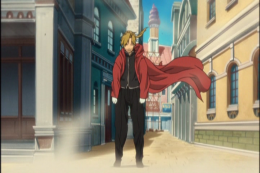
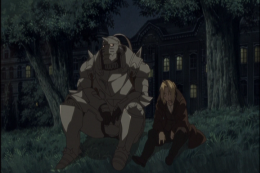
It's not a perfect movie. The final battle is a bit anti-climactic, as the main antagonist's ultimate goal just seems to be simple fear and hatred, and the way she's taken down seems to be after little fanfare. It often feels like the movie would have been better as multiple episodes of an OVA, as there seems to be a lack of transition and places that could use a little more development. They never really go anywhere with the Huskisson angle, and how his bomb is now in our world (it almost seems like a sequel hook that didn't pan out). Hohenheim feels like an afterthought. Again. And yes, LOLNAZIS. It's not like Edward was punching Hitler in the face like Captain America, though. Or would that have been better? I don't know what any of you want. I really like this movie. I mean, really. It's got this great thematic/emotional power to it that feels like a good capper to the TV series. Was it absolutely necessary to see how Edward and Alphonse reunite? Not really. The TV ending leaves you with a hope that one day they will meet again, even if you don't necessarily know how. But this movie was a very good wrap up and they even managed to sneak in a history lesson or two in there. Well, as long as you don't believe that the Thule Society captured a dragon. It might not be the greatest anime movie of all time, but it's a damn good one.
Hey, even Shamballa isn't paradise.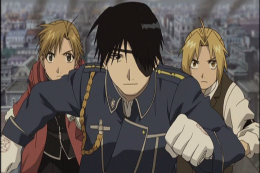
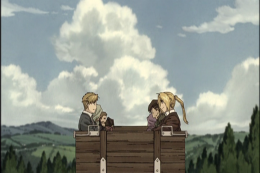 Overall Score:
4 out of 5
Overall Score:
4 out of 5

